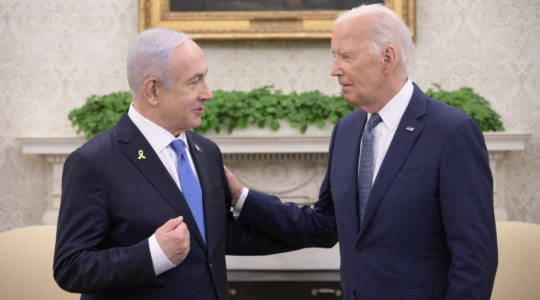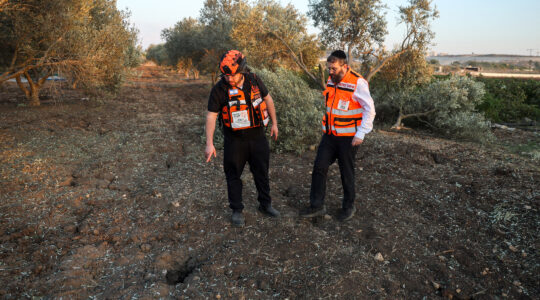JERUSALEM (JTA) – For years the “two-state solution,” envisioning Israel and Palestine living side by side in peace, has been the almost exclusive formula for resolving the Israeli-Palestinian conflict.But the Hamas takeover of Gaza last month is challenging conventional wisdom. Following the coup, politicians and pundits are expressing grave doubts about the viability of the two-state concept and are floating new alternatives.The problem is simple: With Hamas in control in Gaza and the rival Fatah ruling the West Bank, how can a unified Palestinian state be established in the West Bank and Gaza?In other words, with Hamas’ growing strength and Fatah’s weakness reflected in the Gaza takeover, how can Palestinian Authority President Mahmoud Abbas of Fatah make a two-state deal with Israel that would stick?The foreign ministers of Egypt and Jordan are due in Israel this week, representing the Arab League in its first visit to the country. The delegation will discuss the threat posed by Hamas and Islamic extremism, as well
as the 22-nation league’s peace proposal. The plan offers full Arab recognition of
Israel in exchange for its full withdrawal from lands captured in the 1967
Six-Day War, repatriation of Palestinian refugees and the creation of a
Palestinian state.But the Arab League plan is unlikely to provide a
framework to circumvent the Hamas-Fatah split. Indeed, it will likely
only get off the ground if there is significant progress on the
Israeli-Palestinian track.Following are some of the new ideas that would circumvent the changes on the Palestinian side of the equation:* The return of the Jordanian option:For many years the Labor Party in Israel advocated solving the Palestinian problem in a deal with Jordan, which would take back most of the West Bank, annex Gaza and establish a Jordanian-Palestinian federation or confederation. This idea, without the Gaza element, is now enjoying something of revival. A number of conservative American think tanks are suggesting some form of political connection between Jordan and the West Bank as the most practical option in the new circumstances.The Palestinian radicals in Gaza would be circumvented, and the moderates in the West Bank would be buttressed by a union with the pro-Western Hashemite monarchy. Privately, some senior Fatah people, once mortal enemies of the Hashemites, claim to be interested. Former Jordanian Prime Minister Abdel Salam Majali, who reportedly backs the confederation idea, maintains that it has significant grassroots support.Palestinian research seems to bear him out. A recent poll conducted by Khalil Shikaki of the Palestinian Center for Policy and Survey Research found that as many as 42 percent of Palestinians would back a union with Jordan.But here’s the problem: The Jordanian king and current prime minister are dead-set against the federation-confederation proposal.”We reject the formula of confederation and federation, and we believe that proposing this issue at this specific point in time is a conspiracy against both Palestine and Jordan,” King Abdullah declared in early July.The non-Palestinian East Bank elite around Abdullah have no interest in co-opting more than 2 million West Bank Palestinians into the kingdom and significantly worsening the demographic balance against them. Nor do they relish the prospect of taking Israel’s place in policing radical hot spots like Nablus or Hebron.* The regional solution:For the Israeli right, the Hamas takeover in Gaza illustrates what it sees as the inherent frailty of the two-state approach.”The Oslo process is predicated on the need for a Palestinian state,” says Benny Elon, chairman of the hawkish National Union, “but everything that has happened since shows that it would destabilize the entire region.”Elon proposes using the current West Bank-Gaza divide to solve the West Bank question with Jordan and the Gaza problem with Egypt, even though neither Arab state has shown the slightest inclination to be involved in this way.In Elon’s scheme, Israel and Jordan would negotiate over sharing functional responsibilities for the West Bank, West Bank Palestinians would become citizens of Jordan and vote there, Jewish settlers would be Israeli citizens and vote for the Knesset. In Gaza, the main thrust would be to put an end to Palestinian “refugeehood” by offering refugees a choice between a lump sum and relocation abroad or rehousing in Gaza.”The goal,” Elon says, “should be to get rid of the Gaza refugee camps over a 10-year period.”* Two states in stages:The idea here, favored by the Israeli government, the Israeli left and the U.S. administration, is to maintain the two-state approach but defer its implementation. Israel and the Palestinian moderates under Abbas would negotiate the contours of a final peace deal, with the understanding that any agreements would become operational only when circumstances permitted.U.S. Secretary of State Condoleezza Rice calls this a “shelf deal” – that is, a deal to be negotiated, shelved and only used when conditions are ripe. The most outspoken advocate of this approach on the Israeli side is Foreign Minister Tzipi Livni, who argues that once Palestinian moderates are reassured about the kind of final peace deal being offered, they will have a strong incentive to take the steps they need to get there. One example cited is the need to disarm the militias and clamp down on terror.Under this scenario, the boycott on Hamas in Gaza would continue and everyday life in the West Bank would significantly improve, with credit for the change going to the moderates. The problem is that Hamas is unlikely to allow any of this to happen without a major fight. And that could mean more terror rather than less.*Long-term cease-fire with Hamas:Some Israelis, such as the former Mossad chief Ephraim Halevi and former Foreign Minister Shlomo Ben Ami, advocate negotiating a long-term cease-fire, or hudna, with Hamas. Their approach is based on the assumption that no matter how much Israel and the international community do to strengthen Abbas, he will be too weak to deliver.They conclude that any serious Israeli-Palestinian peacemaking will have to find a way to include Hamas and allow for its input in the process. Hamas and Fatah would be encouraged to settle their differences, so the Palestinians can present a united front in negotiations with Israel. The goal would be to draw Hamas into an Israeli-Palestinian peace deal, which it might not like but would accept for want of a better choice.Clearly the Hamas takeover in Gaza has led to a shake-up in political
thinking on the Israeli-Palestinian track. But just one month after
everything changed, it is too early to say whether any of this new thinking will take
root or have a significant impact on the conflict.

Help ensure Jewish news remains accessible to all. Your donation to the Jewish Telegraphic Agency powers the trusted journalism that has connected Jewish communities worldwide for more than 100 years. With your help, JTA can continue to deliver vital news and insights. Donate today.





